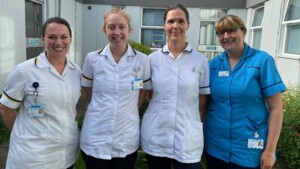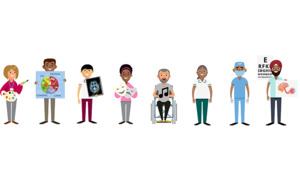
Allied Health Professionals
What is an Allied Health Professional?
Allied Health Professionals (AHPs) are a diverse group of healthcare professionals that deliver high quality care and support across different care pathways and in different settings. Their work complements and supports the work of a number of other healthcare professionals.
In oncology, AHPs have a significant impact on people living with cancer in many areas like:
- quality of life
- physical fitness and mobility
- wellbeing and mental health
- fatigue
- communication
- swallowing
- nutrition
- function
- pain
- incontinence.
AHPs work with other healthcare professionals in a multidisciplinary team (MDT) to diagnose, treat and support patients with cancer. They also connect people living with cancer to other services in their communities, primary care, social care, and other healthcare settings.
AHPs play an important role throughout a person's cancer experience - from prevention, before, during and after treatment with prehabilitation and rehabilitation, through to palliative and end of life care.
Rebecca, diagnosed with tongue cancer
Types of Allied Health Professionals
-
Art therapists
Art therapy uses creativity to help people manage emotional and psychological challenges. It uses psychological therapies and artistic practices to support healing, growth and self-expression.
Art therapists work with people of all ages. They help by addressing issues such as anxiety, depression, and trauma.
Art therapists work in diverse settings, including hospitals, mental health clinics and schools. They work with other healthcare professionals in holistic care.
In oncology, art therapists provide vital therapeutic support for patients and families affected by cancer.
-
Diagnostic radiographer
A diagnostic radiographer uses medical imaging equipment to produce internal body structure images. These images are vital for diagnosing and monitoring medical conditions.
Diagnostic radiographers work in hospitals and health centres. They perform tasks such as:
- operating imaging equipment like x-ray, CT, MRI and ultrasound machines
- positioning patients accurately and ensuring radiation safety
- interpreting x-ray, ultrasound and CT images
- explaining procedures, obtaining consent and addressing patient concerns.
Diagnostic radiographer work closely with radiologists, doctors and other healthcare professionals. They ensure that the imaging process is efficient and effective in aiding patient diagnosis and treatment.
The role is essential in oncology for cancer detection, diagnosis, and treatment.
-
Dietitian
Dietitians diagnose and treat diet and nutritional problems. They support changes to food intake to address health issues, such as:
-
diabetes
-
food allergies
-
coeliac disease
- metabolic diseases.
Oncology dietitians assess what nutrition advice is needed at each stage of a person's cancer care. They work with patients and their GP, consultants, nurses and other health professionals.
An oncology dietitian will work with the patient to understand their nutrition and how it is being impacted by cancer and its treatment. This can include helping a patient with eating problems.
Dietitians can work in primary care, community settings, hospitals, and hospices.
-
-
Drama therapist
Drama therapists use creative elements such as:
- roleplay
- improvisation
- storytelling
- movement.
These are used to help people explore their emotions, thoughts, behaviours, and coping strategies.
Drama therapy can be helpful for people who struggle to express themselves verbally. Drama therapy offers ways to create new perspectives, build confidence and deal with resolving issues.
Drama therapists can practice in settings such as mental health clinics, hospitals, and schools. They often collaborate with other healthcare professionals to provide holistic care.
In oncology, drama therapy is used to help people affected by cancer. They collaborate with patients and those that care for them to address emotional challenges caused by cancer. This is done in a safe and supportive space.
-
Music therapist
A music therapist uses music as a tool to address a person’s physical, emotional, cognitive, and social needs. People can have music therapy individually or within a group.
Music therapy can benefit people with:
- neurological disorders
- dementia
- physical disabilities
- mental health issues.
It also offers an effective way to expression non-verbal communication.
Music therapists assess and create tailored music-based interventions. In oncology, they offer holistic support to people with cancer by addressing their physical, emotional and psychological wellbeing.
-
Occupational therapist
Occupational therapists (OT) help people who have difficulty carrying out day-to-day activities. They work with people of all ages and aim to boost independence, enhance wellbeing, and improve quality of life.
OTs work with people with diverse conditions or disabilities. They help them to achieve meaningful activities which are crucial for daily life, such as:
- dressing
- cooking
- working
- taking part in hobbies.
In oncology, an OT works with people living with cancer to help them set goals which are important to them. The OT will assess the person’s challenges and needs, and then offer advice and techniques to adapt to or overcome challenges to address them. OTs can offer advice on exercise, counselling, advocacy, and education.
-
Operating department practitioner
Operating department practitioners (ODPs) provide care and support to patients at all stages of an operation. They mainly work in hospitals.
They play an important part in 3 phases of perioperative care: anaesthetic, surgery and recovery. Perioperative care is provided before and after an operation.
Anaesthetic
ODPs prepare and check a wide range of specialist equipment to ensure patient safety. These include:
- anaesthetic machines
- patient monitors
- intravenous pumps
- device that secures patient's airway during operation.
- They will also greet the patient and help them to feel more at ease.
ODPs work with the anaesthetist and assist with the administration of anaesthetic for the operation.
Surgery
ODPs play an important part of the surgery team by:
- preparing necessary instruments and equipment for surgery, including microscopes, lasers and endoscopes
- providing the correct surgical instruments and materials to the surgeon
- providing equipment and swabs during the operation
- acting as a link between the surgical team and other parts of the theatre and hospital.
Recovery
After the operation, ODPs will support and monitor the patient on their arrival to the recovery unit.
They provide appropriate treatment until the patient has recovered from the effects of the anaesthesia or surgery.
ODPs will assess the patient so they can be discharged back to a ward.
-
Orthoptist
Orthoptists diagnoses and treats disorders related to binocular vision and eye movement. They work with other optometry professionals to perform tests which evaluate eye movements, depth perception, and binocular vision.
Orthoptists can help treat conditions such as:
- amblyopia (also known as lazy eye)
- misalignment of the eyes (strabismus)
- eye movement disorders caused by diabetes, hypertension, stroke, trauma, or cancer.
An orthoptist will design treatment plans that can help enhance eye coordination. They collaborate with other healthcare professionals to manage complex eye conditions.
They are based in hospital, clinic, and community settings and play a vital role in helping people with their visual health.
In oncology, orthoptists assess and managing ocular and visual issues caused by cancer and its treatments. They play a vital role in improving quality of life for people by helping to address their vision concerns.
-
Orthotist
An orthotist specialises in the design, fabrication, and fitting of orthoses. Orthoses are medical devices fitted to the body, such as braces and splints, to help people:
- improve mobility
- correct gait abnormalities
- prevent falls
- reduce pain.
People with musculoskeletal disorders and neuromuscular issues are prescribed them.
Orthotists use their knowledge of biomechanics, anatomy and materials to engineer personalised orthotic aids.
In oncology, orthotists provide support and care for people living with cancer who need orthotic device because of the effects of cancer treatment on the musculoskeletal system. They help patients to:
- maintain or regain mobility and physical function
- reduce pain
- enhance quality of life.
-
Osteopath
An osteopath uses their knowledge and hands-on techniques to diagnose, treat and prevent musculoskeletal conditions. They focus on improving body alignments, movement and pain relief.
In oncology, osteopaths help with managing side effects, pain and other challenges caused by cancer and its treatments to improve the wellbeing of people living with cancer.
-
Paramedic
Paramedics are highly trained healthcare professionals who provide emergency and non-emergency medical care.
Within the ambulance service, paramedics often respond to urgent 999 or 111 calls. They are frequently the first to arrive to accidents or medical crises.
Paramedics can play an important role in supporting people living with cancer and oncology teams. They have diverse skills and knowledge of patient care pathways, which enables them to meet the complex needs of people living with cancer.
-
Physiotherapist
A physiotherapist helps people with physical impairments, injuries or disabilities to improve mobility, function and quality of life. They use techniques and exercises to address musculoskeletal, neurological, and cardiopulmonary conditions.
In oncology, physiotherapists help people living with cancer from diagnosis through to end of life care. This includes :
- being part of a multidisciplinary team
- conducting assessments to understand the needs of people with cancer and their carers
- applying skilled interventions that help people have independence and a improved quality of life.
They play an important role in rehabilitation and management of patients with cancer who are in palliative care.
-
Podiatrist
Podiatrists assess, diagnose, and treat conditions that affect the foot and lower limb. They perform foot assessments, diagnose conditions such as bunions and calluses, and offer treatments such as foot and nail care, wound management, and correction of abnormalities. They promote foot health, managing chronic conditions, and aiding patients with mobility challenges.
In oncology, podiatrists address foot-related issues resulting from cancer and its treatments. They assess foot health for complications linked to chemotherapy and radiotherapy, such as peripheral neuropathy and skin changes.
They can manage chemotherapy-induced peripheral neuropathy symptoms, offer insole therapy, and strategies to improve foot function and mobility. Additionally, some patients may experience wounds or ulcers on their feet, especially if they have weakened immune systems or conditions such as diabetes which can complicate wound healing.
Podiatrists are skilled in wound management, helping to prevent infections and promote healing. They educate patients on foot care during and after treatment, including advice on proper footwear, foot hygiene, early detection of foot problems and preventative measures.
-
Prosthetist
A prosthetist creates and fits customised artificial replacement limbs for people who have lost limbs or were born without them. These replacement limbs are often called a prosthetic device or limb.
Prosthetists works with patients to assess their needs and create tailored prosthetic limbs. The aim of prosthetic devices is to restore and support mobility, independence, and quality of life.
In oncology, prosthetists provide support and care for people who have had surgical amputations due to cancer and its treatment. They assist patients to regain mobility, function, and independence using prosthetic devices.
-
Speech and language therapist
Speech and language therapists (SLTs) help people who have difficulties with communication. They also help people who have problems with eating, drinking or swallowing.
SLTS work in primary care, community settings, hospitals and hospices.
People with laryngeal (voice box) cancer or cancers of the tongue or mouth may need speech and language therapy. These types of cancers can affect speech and people may need to learn new methods of speaking.
Some of the techniques SLTs use include smartphone apps and a special device called a electrolarynx.
Cancer can affect a person's throat or ability to move the tongue and jaw. Some people experience swallowing problems immediately after cancer treatment. Others have symptoms months or years later. If this happens, a patient may get swallow therapy.
Swallow therapy includes exercises to improve strength and coordination necessary for swallowing.
-
Therapeutic radiographer
Therapeutic radiographers plan and deliver radiotherapy treatments.
Their responsibilities include:
- using advanced imaging techniques to identify location and size of tumours
- working with other healthcare professionals to plan personalised treatments
- operating radiation equipment to give external beam radiotherapy or brachytherapy
- prioritising patient safety
- reviewing progress and adjusting treatment plans for patients
- engaging in research to enhance skills and stay current in their field.
How do I become an Allied Health Professional?
Many allied health professions require a degree level education either through a university degree or through a degree apprenticeship.
This degree-level education will give you hands-on experience in a AHP role and can include:
- going on work placements
- meeting and working with other healthcare specialists in your field
- working with other members of the multidisciplinary teams
- exploring how the role works in different health and care settings.
Depending on the course you choose, your studies can last 2 to 5 years. You may be able to do a degree full time or part time.
To find out more about different allied health professions and required degrees and training, visit the NHS Health Careers website.
-
How do I become an Allied Health Professional in cancer care?
Many AHPs see people with cancer as part of their day to day work in hospital, outpatient clinics, primary care, community settings and hospices.
Some AHP roles are oncology specialist roles where the majority of their daily work is with people with cancer. These roles are usually in hospitals and specialist cancer centres.
If you are interested in a specialist roles it may be helpful to:
- enrol in training to gain knowledge and experience needed to work in oncology
- search and review specialist roles job listings to understand what specific experiences and knowledge you may need
- speak to a AHP in an oncology specialist role.
-
How do I become a Macmillan Allied Health Professional?
Most Macmillan Professional roles are not directly recruited by us. Instead, they are advertised and recruited through our partner organisations. We encourage those interested in working as a Macmillan Professional to apply for these roles. However, these roles may not always be available.









